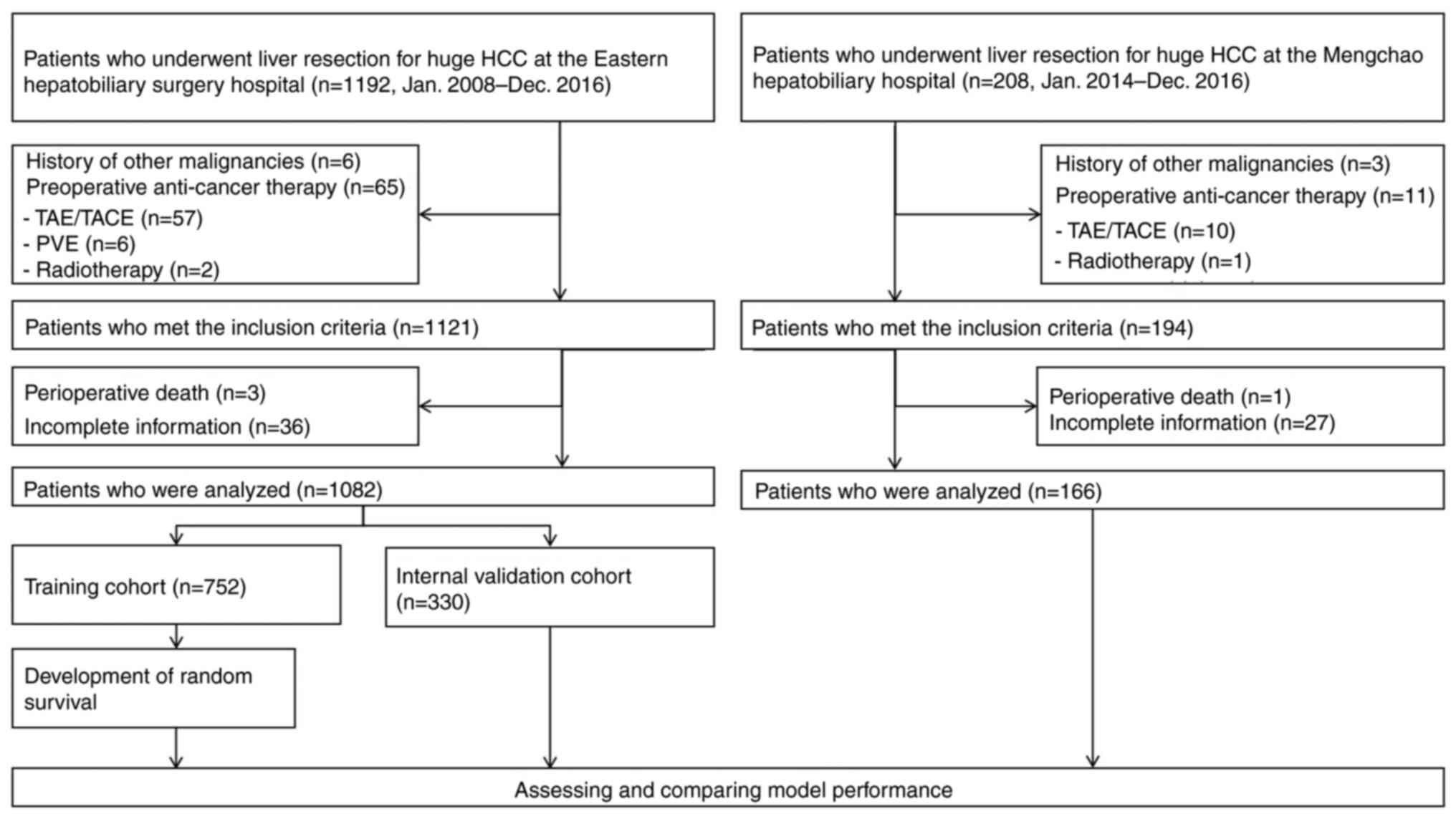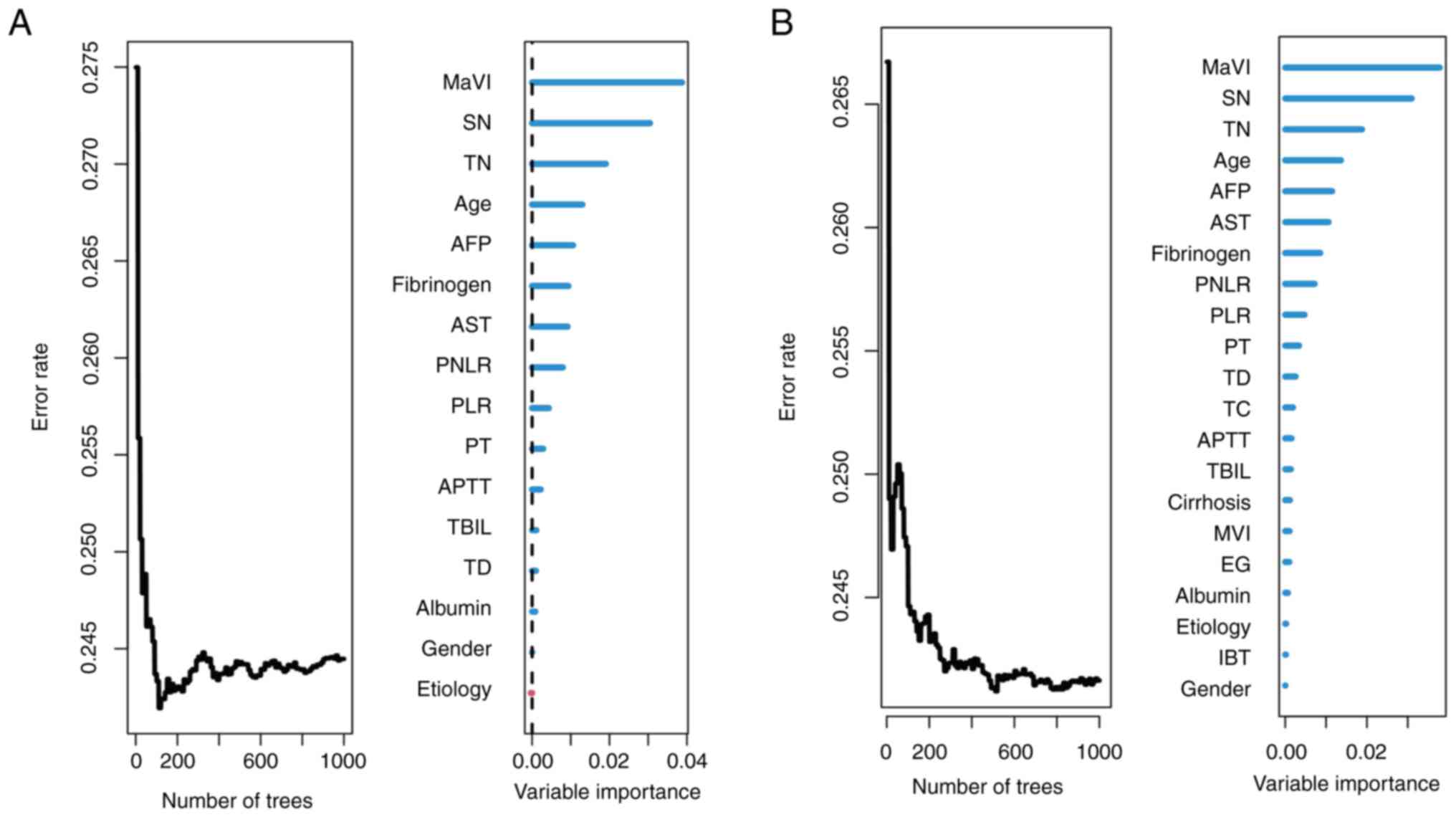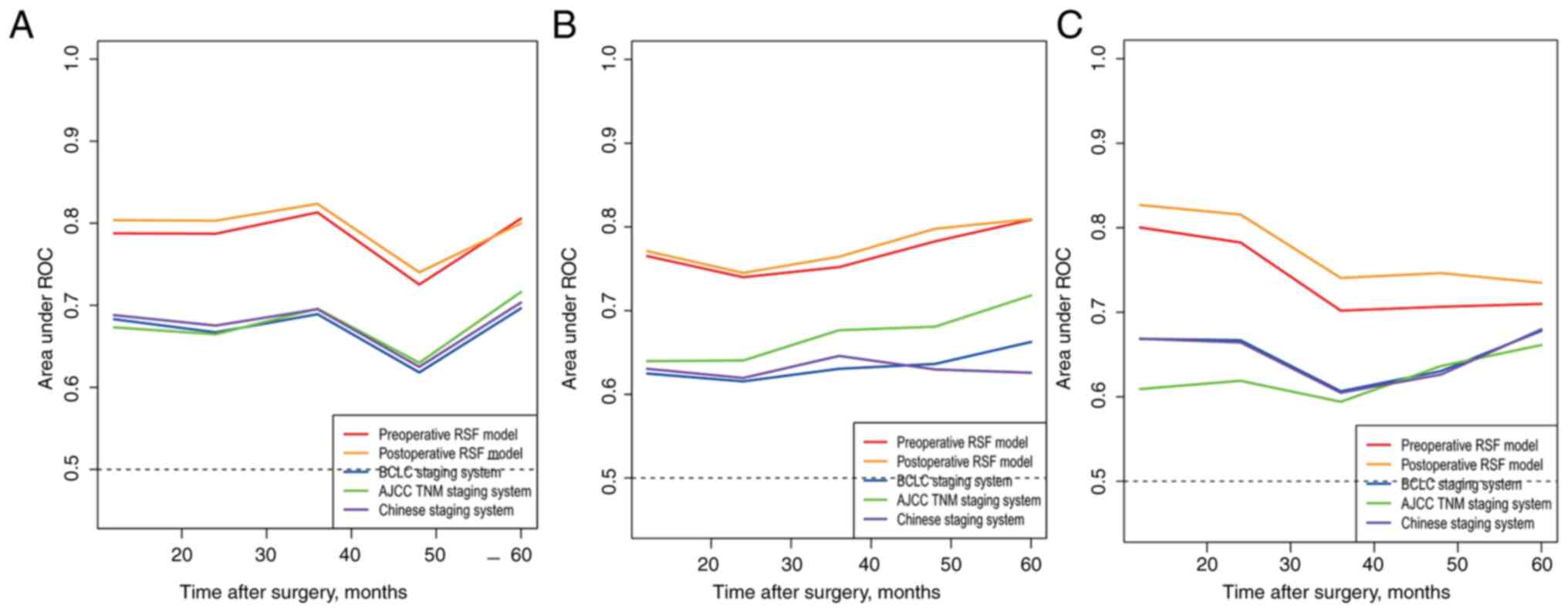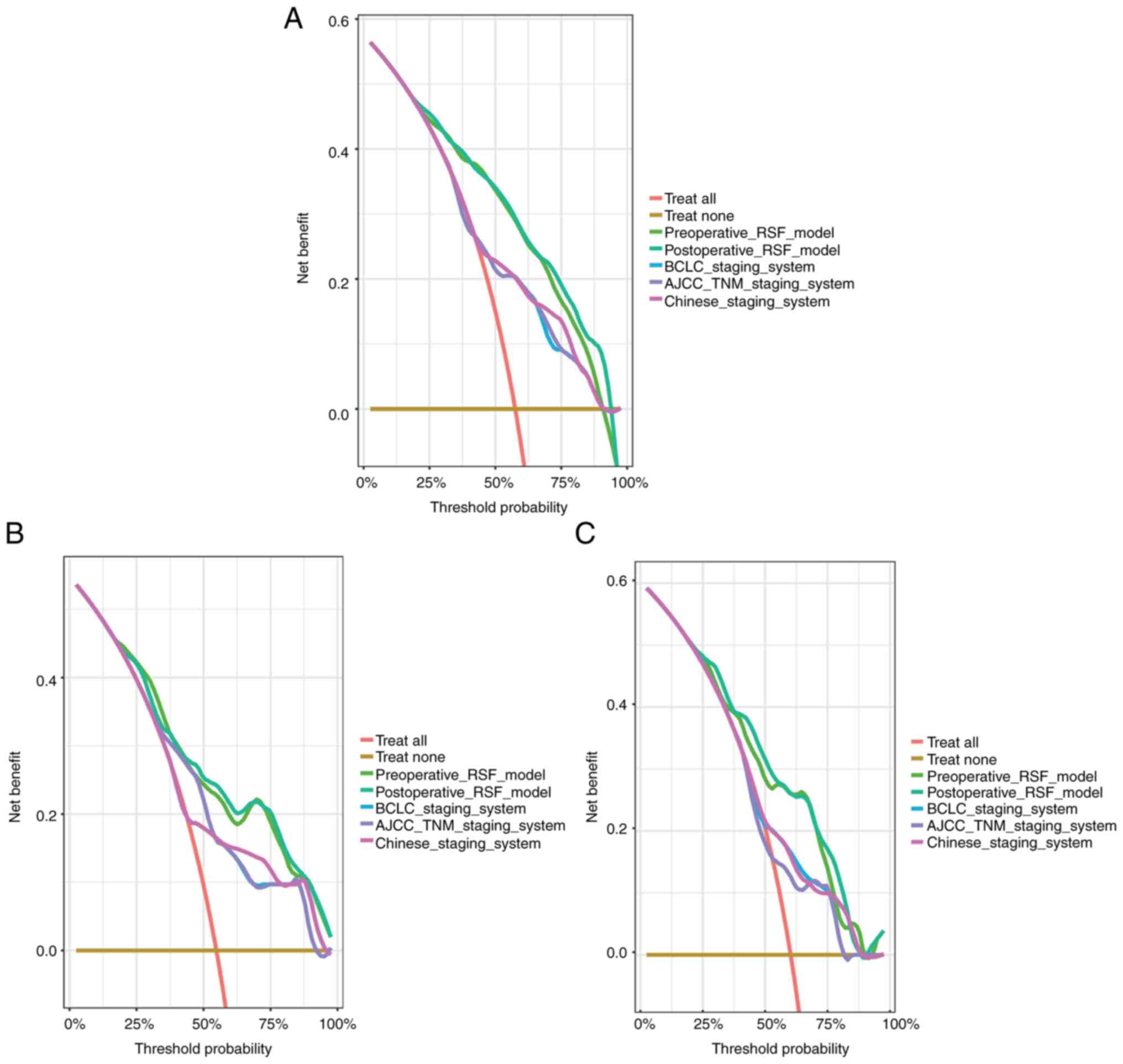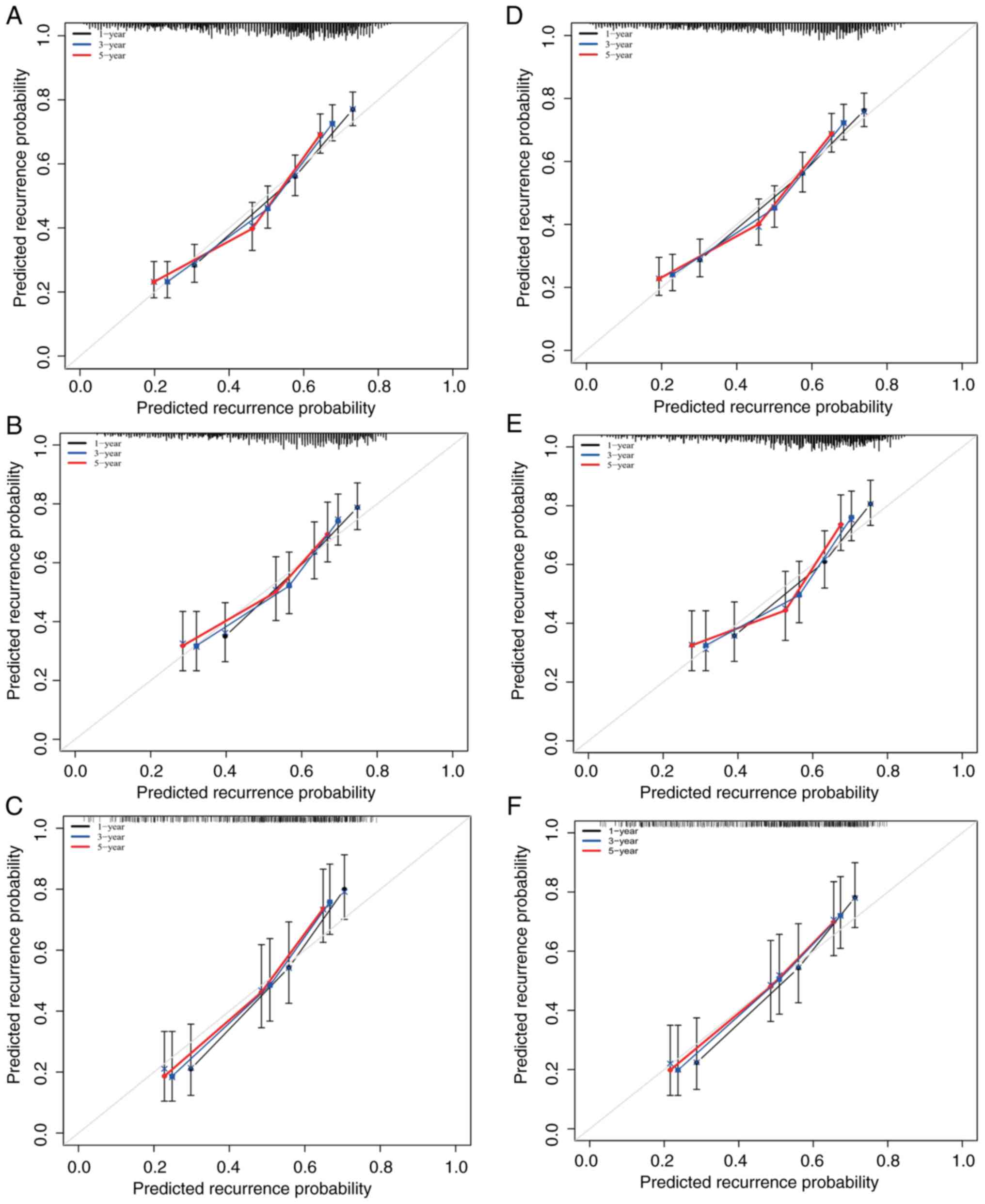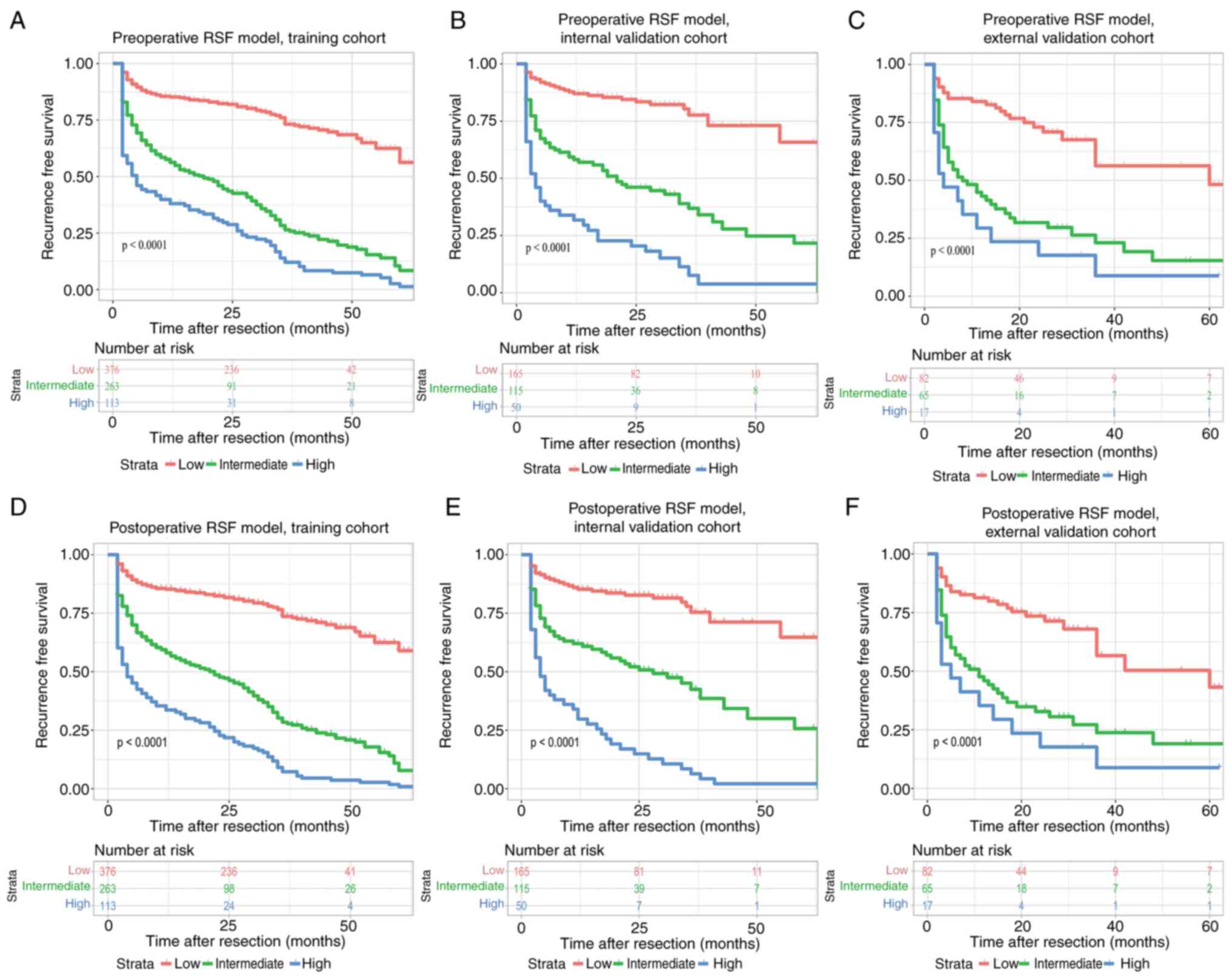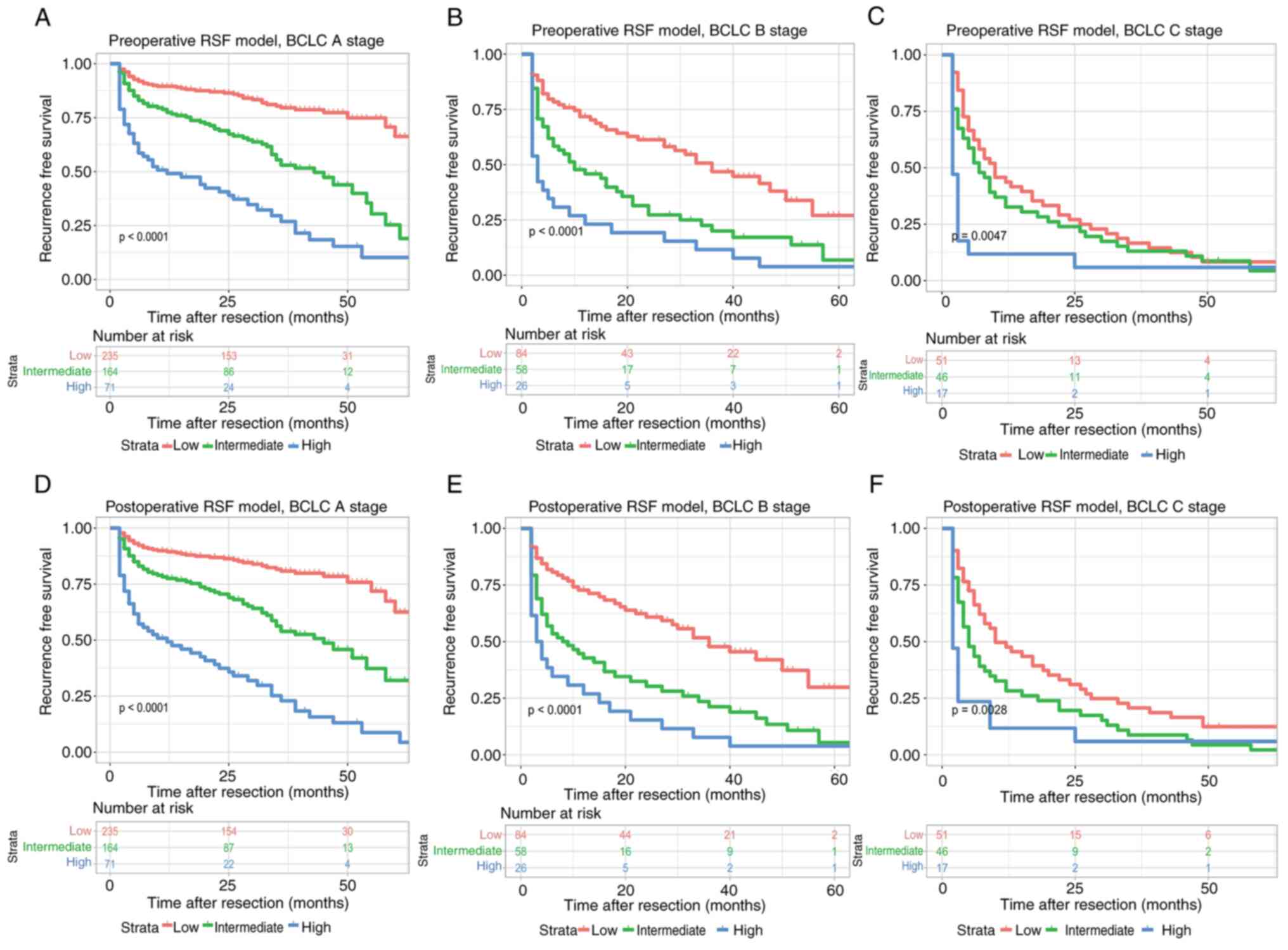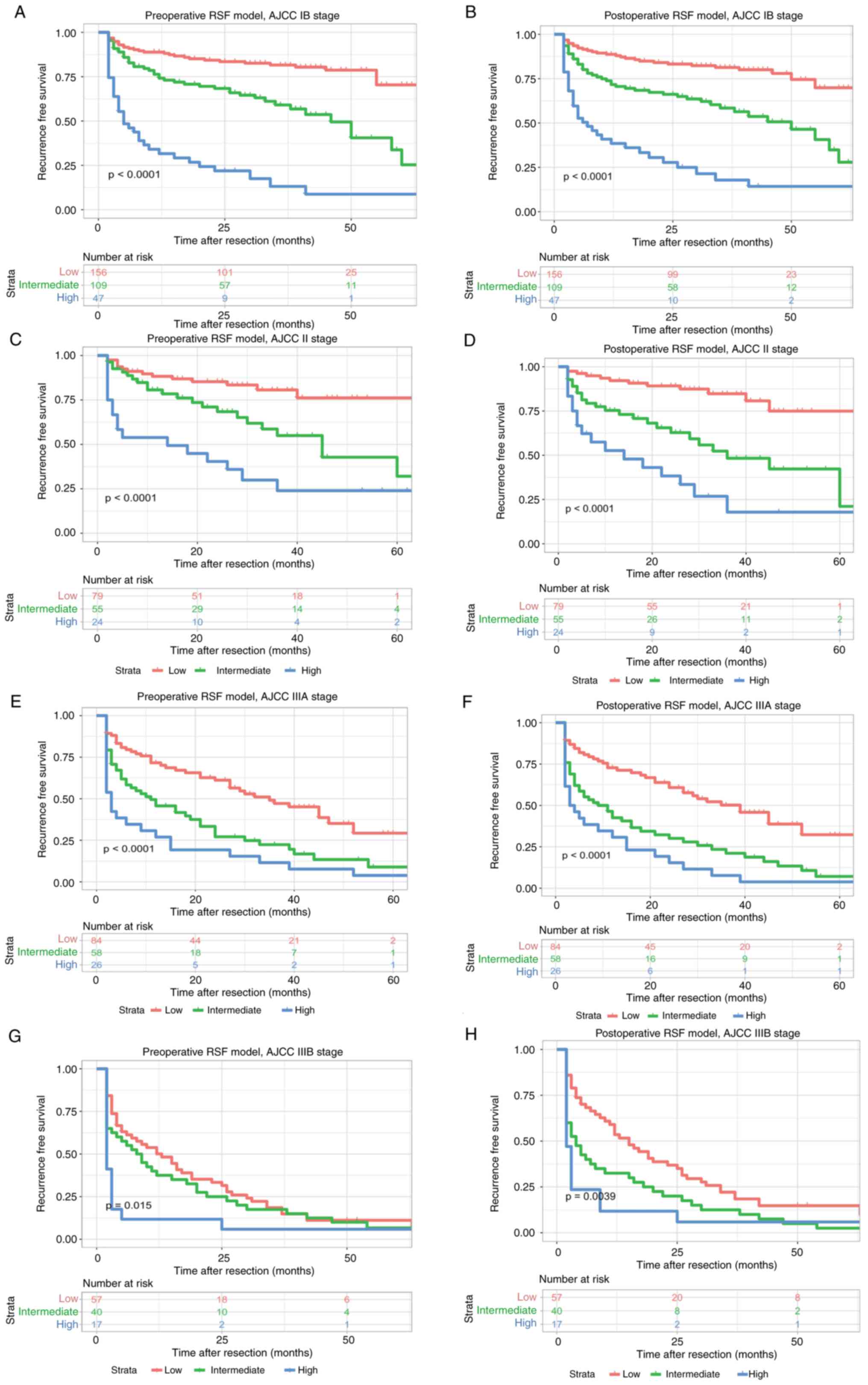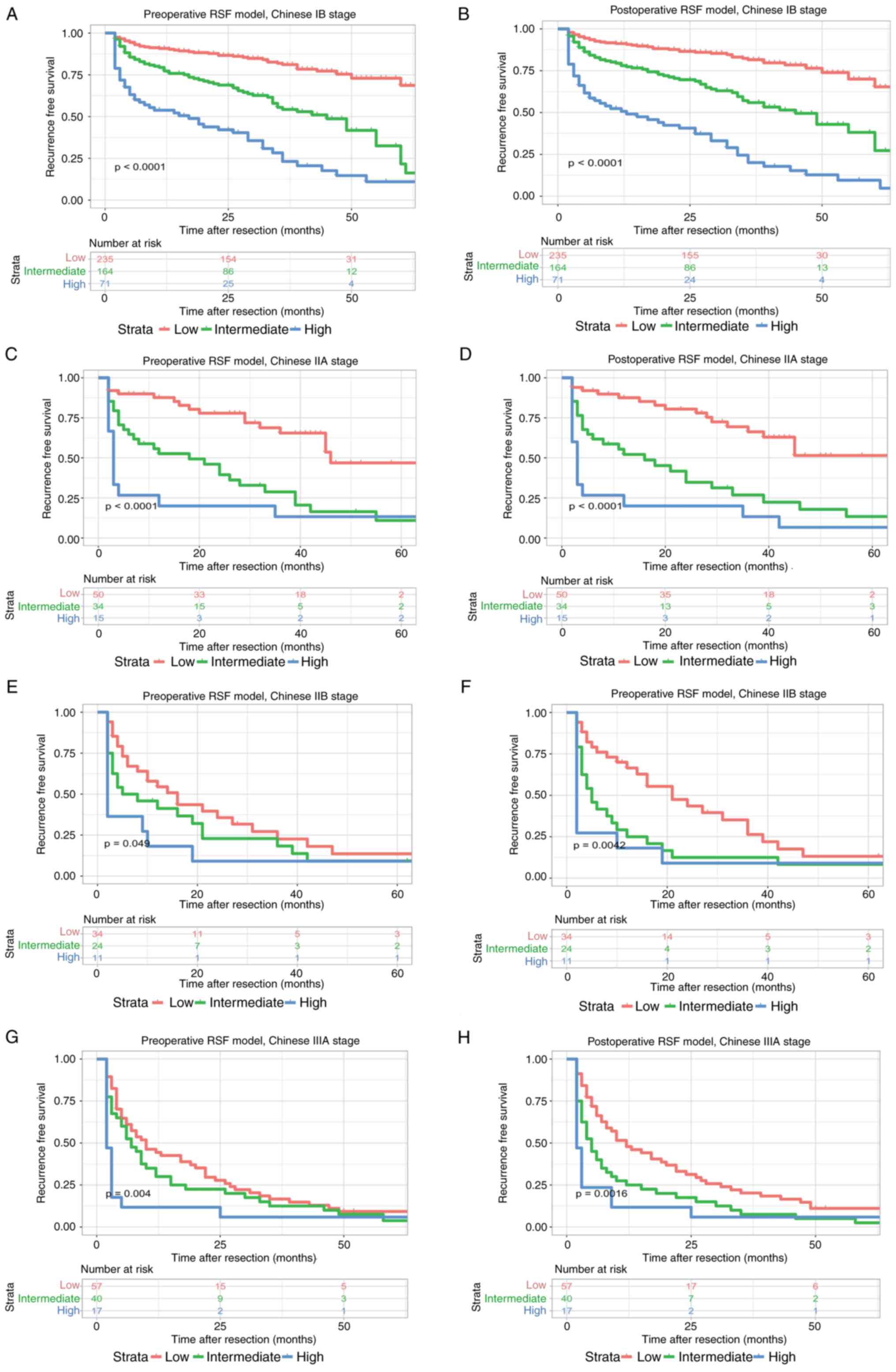|
1
|
Bray F, Ferlay J, Soerjomataram I, Siegel
RL, Torre LA and Jemal A: Global cancer statistics 2018: GLOBOCAN
estimates of incidence and mortality worldwide for 36 cancers in
185 countries. CA Cancer J Clin. 68:394–424. 2018. View Article : Google Scholar : PubMed/NCBI
|
|
2
|
Kim JM, Joh JW, Yi NJ, Choi GS, Kim K, Lee
KW and Suh KS: Predicting hepatocellular carcinoma recurrence
beyond milan criteria after liver resection for solitary
hepatocellular carcinoma. J Gastrointest Surg. 24:2219–2227. 2020.
View Article : Google Scholar : PubMed/NCBI
|
|
3
|
Nakagawa S, Wei L, Song WM, Higashi T,
Ghoshal S, Kim RS, Bian CB, Yamada S, Sun X, Venkatesh A, et al:
Molecular liver cancer prevention in cirrhosis by organ
transcriptome analysis and lysophosphatidic acid pathway
inhibition. Cancer Cell. 30:879–890. 2016. View Article : Google Scholar : PubMed/NCBI
|
|
4
|
Zhang H, Liu F, Wen N, Li B and Wei Y:
Patterns, timing, and predictors of recurrence after laparoscopic
liver resection for hepatocellular carcinoma: Results from a
high-volume HPB center. Surg Endosc. 36:1215–1223. 2022. View Article : Google Scholar : PubMed/NCBI
|
|
5
|
Ruiz E, Pineau P, Flores C, Fernández R,
Cano L, Cerapio JP, Casavilca-Zambrano S, Berrospi F, Chávez I,
Roche B and Bertani S: A preoperative nomogram for predicting
long-term survival after resection of large hepatocellular
carcinoma (>10 cm). HPB (Oxford). 24:192–201. 2022. View Article : Google Scholar : PubMed/NCBI
|
|
6
|
Hong SK, Lee KW, Hong SY, Suh S, Hong K,
Han ES, Lee JM, Choi Y, Yi NJ and Suh KS: Efficacy of liver
resection for single large hepatocellular carcinoma in child-pugh a
cirrhosis: Analysis of a nationwide cancer registry database. Front
Oncol. 11:6746032021. View Article : Google Scholar : PubMed/NCBI
|
|
7
|
Zhong NB, Lv GM and Chen ZH: Stereotactic
body radiotherapy combined with transarterial chemoembolization for
huge (≥10 cm) hepatocellular carcinomas: A clinical study. Mol Clin
Oncol. 2:839–844. 2014. View Article : Google Scholar : PubMed/NCBI
|
|
8
|
Bai Y, Wu J, Zeng Y, Chen J, Wang S, Chen
S, Qiu F, Zhou S, You S, Tian Y, et al: Nomogram for predicting
long-term survival after synchronous resection for hepatocellular
carcinoma and inferior vena cava tumor thrombosis: A multicenter
retrospective study. J Oncol. 2020:32640792020. View Article : Google Scholar : PubMed/NCBI
|
|
9
|
Chan AWH, Zhong J, Berhane S, Toyoda H,
Cucchetti A, Shi K, Tada T, Chong CCN, Xiang BD, Li LQ, et al:
Development of pre and post-operative models to predict early
recurrence of hepatocellular carcinoma after surgical resection. J
Hepatol. 69:1284–1293. 2018. View Article : Google Scholar : PubMed/NCBI
|
|
10
|
Mao S, Yu X, Shan Y, Fan R, Wu S and Lu C:
Albumin-Bilirubin (ALBI) and monocyte to lymphocyte ratio
(MLR)-based nomogram model to predict tumor recurrence of
AFP-negative hepatocellular carcinoma. J Hepatocell Carcinoma.
8:1355–1365. 2021. View Article : Google Scholar : PubMed/NCBI
|
|
11
|
Camacho DM, Collins KM, Powers RK,
Costello JC and Collins JJ: Next-generation machine learning for
biological networks. Cell. 173:1581–1592. 2018. View Article : Google Scholar : PubMed/NCBI
|
|
12
|
Wang S and Summers RM: Machine learning
and radiology. Med Image Anal. 16:933–951. 2012. View Article : Google Scholar : PubMed/NCBI
|
|
13
|
Rajkomar A, Dean J and Kohane I: Machine
learning in medicine. N Engl J Med. 380:1347–1358. 2019. View Article : Google Scholar : PubMed/NCBI
|
|
14
|
Huang Y, Chen H, Zeng Y, Liu Z, Ma H and
Liu J: Development and validation of a machine learning prognostic
model for hepatocellular carcinoma recurrence after surgical
resection. Front Oncol. 10:5937412020. View Article : Google Scholar : PubMed/NCBI
|
|
15
|
Knottnerus A and Tugwell P: STROBE-a
checklist to strengthen the reporting of observational studies in
epidemiology. J Clin Epidemiol. 61:3232008. View Article : Google Scholar : PubMed/NCBI
|
|
16
|
Marrero JA, Kulik LM, Sirlin CB, Zhu AX,
Finn RS, Abecassis MM, Roberts LR and Heimbach JK: Diagnosis,
staging, and management of hepatocellular carcinoma: 2018 practice
guidance by the american association for the study of liver
diseases. Hepatology. 68:723–750. 2018. View Article : Google Scholar : PubMed/NCBI
|
|
17
|
Yang P, Qiu J, Li J, Wu D, Wan X, Lau WY,
Yuan Y and Shen F: Nomograms for pre- and postoperative prediction
of long-term survival for patients who underwent hepatectomy for
multiple hepatocellular carcinomas. Ann Surg. 263:778–786. 2016.
View Article : Google Scholar : PubMed/NCBI
|
|
18
|
Taylor JM: Random survival forests. J
Thorac Oncol. 6:1974–1975. 2011. View Article : Google Scholar : PubMed/NCBI
|
|
19
|
Ishwaran H, Kogalur UB, Blackstone EH and
Lauer MSJTaoas: Random survival forests. The Annals of Applied
Statistics. 2:841–860. 2008. View Article : Google Scholar : PubMed/NCBI
|
|
20
|
Royston P and Altman DG: External
validation of a Cox prognostic model: Principles and methods. BMC
Med Res Methodol. 13:332013. View Article : Google Scholar : PubMed/NCBI
|
|
21
|
Mogensen UB, Ishwaran H and Gerds TA:
Evaluating random forests for survival analysis using prediction
error curves. J Stat Softw. 50:1–23. 2012. View Article : Google Scholar : PubMed/NCBI
|
|
22
|
Zhang XP, Wang K, Gao YZ, Wei XB, Lu CD,
Chai ZT, Zhen ZJ, Li J, Yang DH, Zhou D, et al: Prognostic model
for identifying candidates for hepatectomy among patients with
hepatocellular carcinoma and hepatic vein invasion. Br J Surg.
107:865–877. 2020. View Article : Google Scholar : PubMed/NCBI
|
|
23
|
Chun YS, Pawlik TM and Vauthey JN: 8th
edition of the AJCC cancer staging manual: Pancreas and
hepatobiliary cancers. Ann Surg Oncol. 25:845–847. 2018. View Article : Google Scholar : PubMed/NCBI
|
|
24
|
European Association for the Study of the
Liver. Electronic address, . simpleeasloffice@easloffice.eu;
European Association for the Study of the Liver: EASL clinical
practice guidelines: Management of hepatocellular carcinoma. J
Hepatol. 69:182–236. 2018. View Article : Google Scholar : PubMed/NCBI
|
|
25
|
Qiu G, Jin Z, Chen X and Huang J:
Interpretation of guidelines for the diagnosis and treatment of
primary liver cancer (2019 edition) in China. Glob Health Med.
2:306–311. 2020. View Article : Google Scholar : PubMed/NCBI
|
|
26
|
Li Y, Xia Y, Li J, Wu D, Wan X, Wang K, Wu
M, Liu J, Lau WY and Shen F: Prognostic nomograms for pre- and
postoperative predictions of long-term survival for patients who
underwent liver resection for huge hepatocellular carcinoma. J Am
Coll Surg. 221:962–974.e964. 2015. View Article : Google Scholar : PubMed/NCBI
|
|
27
|
Moncada-Torres A, van Maaren MC, Hendriks
MP, Siesling S and Geleijnse G: Explainable machine learning can
outperform Cox regression predictions and provide insights in
breast cancer survival. Sci Rep. 11:69682021. View Article : Google Scholar : PubMed/NCBI
|
|
28
|
Fang Q, Xie QS, Chen JM, Shan SL, Xie K,
Geng XP and Liu FB: Long-term outcomes after hepatectomy of huge
hepatocellular carcinoma: A single-center experience in China.
Hepatobiliary Pancreat Dis Int. 18:532–537. 2019. View Article : Google Scholar : PubMed/NCBI
|
|
29
|
Li M, Zhao Y, Liu X, Zhang S, Jiang Y and
Yang Z: Early risk warning system for distant metastasis of
hepatitis B virus-associated hepatocellular carcinoma with portal
vein tumor thrombus. Oncol Lett. 19:3249–3257. 2020.PubMed/NCBI
|
|
30
|
Wang L, Liu Z, Liu X, Zeng Y and Liu J:
The hepatectomy efficacy of huge hepatocellular carcinoma and its
risk factors: A meta analysis. Medicine (Baltimore). 96:e92262017.
View Article : Google Scholar : PubMed/NCBI
|
|
31
|
Shin S, Kim TS, Lee JW, Ahn KS, Kim YH and
Kang KJ: Is the anatomical resection necessary for single
hepatocellular carcinoma smaller than 3 cm?: Single-center
experience of liver resection for a small HCC. Ann Hepatobiliary
Pancreat Surg. 22:326–334. 2018. View Article : Google Scholar : PubMed/NCBI
|
|
32
|
Wang XH, Liu QB, Xiang CL, Mao XH, Yang B,
Li Q, Zhou QF, Li SQ, Zhou ZG and Chen MS: Multi-institutional
validation of novel models for predicting the prognosis of patients
with huge hepatocellular carcinoma. Int J Cancer. 149:127–138.
2021. View Article : Google Scholar : PubMed/NCBI
|
|
33
|
Dai T, Deng M, Ye L, Lin G, Liu R, Deng Y,
Li R, Liu W, Li H, Yang Y, et al: Nomograms based on
clinicopathological factors and inflammatory indicators for
prediction of early and late recurrence of hepatocellular carcinoma
after surgical resection for patients with chronic hepatitis B. Ann
Transl Med. 9:122021. View Article : Google Scholar : PubMed/NCBI
|
|
34
|
Xia W, Peng T, Guan R, Zhou Y, Zeng C, Lin
Y, Wu Z and Tan H: Development of a novel prognostic nomogram for
the early recurrence of liver cancer after curative hepatectomy.
Ann Transl Med. 9:15412021. View Article : Google Scholar : PubMed/NCBI
|
|
35
|
Ding HF, Zhang XF, Bagante F, Ratti F,
Marques HP, Soubrane O, Lam V, Poultsides GA, Popescu I,
Alexandrescu S, et al: Prediction of tumor recurrence by
α-fetoprotein model after curative resection for hepatocellular
carcinoma. Eur J Surg Oncol. 47:660–666. 2021. View Article : Google Scholar : PubMed/NCBI
|
|
36
|
Li H, Li S, Geng J, Zhao S, Tan K, Yang Z,
Feng D and Liu L: Efficacy evaluation of the combination therapy of
sorafenib and transarterial chemoembolization for unresectable HCC:
A systematic review and meta-analysis of comparative studies. Ann
Transl Med. 8:5402020. View Article : Google Scholar : PubMed/NCBI
|
|
37
|
Terasawa M, Allard MA, Golse N, Cunha AS,
Cherqui D, Adam R, Saiura A and Vibert E: Sequential transcatheter
arterial chemoembolization and portal vein embolization versus
portal vein embolization alone before major hepatectomy for
patients with large hepatocellular carcinoma: An intent-to-treat
analysis. Surgery. 167:425–431. 2020. View Article : Google Scholar : PubMed/NCBI
|
|
38
|
Torres OJ, Vasques RR, Silva TH,
Castelo-Branco ME and Torres CC: The ALPPS procedure for
hepatocellular carcinoma larger than 10 centimeters. Int J Surg
Case Rep. 26:113–117. 2016. View Article : Google Scholar : PubMed/NCBI
|
|
39
|
Ma L, Deng K, Zhang C, Li H, Luo Y, Yang
Y, Li C, Li X, Geng Z and Xie C: nomograms for predicting
hepatocellular carcinoma recurrence and overall postoperative
patient survival. Front Oncol. 12:8435892022. View Article : Google Scholar : PubMed/NCBI
|
|
40
|
Zhang W, Zhang ZW, Zhang BX, Huang ZY,
Zhang WG, Liang HF and Chen XP: Outcomes and prognostic factors of
spontaneously ruptured hepatocellular carcinoma. J Gastrointest
Surg. 23:1788–1800. 2019. View Article : Google Scholar : PubMed/NCBI
|
|
41
|
Arnaoutakis DJ, Mavros MN, Shen F,
Alexandrescu S, Firoozmand A, Popescu I, Weiss M, Wolfgang CL,
Choti MA and Pawlik TM: Recurrence patterns and prognostic factors
in patients with hepatocellular carcinoma in noncirrhotic liver: A
multi-institutional analysis. Ann Surg Oncol. 21:147–154. 2014.
View Article : Google Scholar : PubMed/NCBI
|
|
42
|
Lee JI, Lee JW, Kim YS, Choi YA, Jeon YS
and Cho SG: Analysis of survival in very early hepatocellular
carcinoma after resection. J Clin Gastroenterol. 45:366–371. 2011.
View Article : Google Scholar : PubMed/NCBI
|
|
43
|
Jiang CH, Yuan X, Li JF, Xie YF, Zhang AZ,
Wang XL, Yang L, Liu CX, Liang WH, Pang LJ, et al:
Bioinformatics-based screening of key genes for transformation of
liver cirrhosis to hepatocellular carcinoma. J Transl Med.
18:402020. View Article : Google Scholar : PubMed/NCBI
|
|
44
|
Zheng J, Shen S, Jiang L, Yan L, Yang J,
Li B, Wen T, Wang W and Xu M: Outcomes of anterior approach major
hepatectomy with diaphragmatic resection for single huge right lobe
HCC with diaphragmatic invasion. Medicine (Baltimore).
97:e121942018. View Article : Google Scholar : PubMed/NCBI
|
|
45
|
Zhou L, Rui JA, Zhou WX, Wang SB, Chen SG
and Qu Q: Edmondson-Steiner grade: A crucial predictor of
recurrence and survival in hepatocellular carcinoma without
microvascular invasio. Pathol Res Pract. 213:824–830. 2017.
View Article : Google Scholar : PubMed/NCBI
|
|
46
|
Wang JC, Hou JY, Chen JC, Xiang CL, Mao
XH, Yang B, Li Q, Liu QB, Chen JB, Ye ZW, et al: Development and
validation of prognostic nomograms for single large and huge
hepatocellular carcinoma after curative resection. Eur J Cancer.
155:85–96. 2021. View Article : Google Scholar : PubMed/NCBI
|
|
47
|
Caram LJ, Calderon F, Masino E, Ardiles V,
Mauro E, Haddad L, Pekolj J, Vicens J, Gadano A, de Santibañes E
and de Santibañes M: Do changes in inflammatory markers predict
hepatocellular carcinoma recurrence and survival after liver
transplantation? Ann Hepatobiliary Pancreat Surg. 26:40–46. 2022.
View Article : Google Scholar : PubMed/NCBI
|
|
48
|
Chen K, Zhan MX, Hu BS, Li Y, He X, Fu SR,
Xin YJ and Lu LG: Combination of the neutrophil to lymphocyte ratio
and the platelet to lymphocyte ratio as a useful predictor for
recurrence following radiofrequency ablation of hepatocellular
carcinoma. Oncol Lett. 15:315–323. 2018.PubMed/NCBI
|
|
49
|
Ismael MN, Forde J, Milla E, Khan W and
Cabrera R: Utility of inflammatory markers in predicting
hepatocellular carcinoma survival after liver transplantation.
Biomed Res Int. 2019:72840402019. View Article : Google Scholar : PubMed/NCBI
|
|
50
|
Lin S, Hu S, Ran Y and Wu F:
Neutrophil-to-lymphocyte ratio predicts prognosis of patients with
hepatocellular carcinoma: A systematic review and meta-analysis.
Transl Cancer Res. 10:1667–1678. 2021. View Article : Google Scholar : PubMed/NCBI
|
|
51
|
Kusumanto YH, Dam WA, Hospers GA, Meijer C
and Mulder NH: Platelets and granulocytes, in particular the
neutrophils, form important compartments for circulating vascular
endothelial growth factor. Angiogenesis. 6:283–287. 2003.
View Article : Google Scholar : PubMed/NCBI
|
|
52
|
An S, Shim H, Kim K, Kim B, Bang HJ, Do H,
Lee HR and Kim Y: Pretreatment inflammatory markers predicting
treatment outcomes in colorectal cancer. Ann Coloproctol.
38:97–108. 2022. View Article : Google Scholar : PubMed/NCBI
|
|
53
|
Lin MS, Gao MJ, Zhang DL, Li XY, Huang JX
and Yu H: Prognostic significance of preoperative
platelet-lymphocyte ratio in a Chinese cohort patient with
colorectal cancer. Int J Clin Exp Pathol. 10:8686–8694.
2017.PubMed/NCBI
|
|
54
|
Yoshida A, Sarian LO, Marangoni MJ,
Firmano IC and Derchain SF: diagnostic value of the
neutrophil/lymphocyte ratio, platelet/lymphocyte ratio, and
thrombocytosis in the preoperative investigation of ovarian masses.
Rev Bras Ginecol Obstet. 42:397–403. 2020. View Article : Google Scholar : PubMed/NCBI
|
|
55
|
Kitayama J, Yasuda K, Kawai K, Sunami E
and Nagawa H: Circulating lymphocyte number has a positive
association with tumor response in neoadjuvant chemoradiotherapy
for advanced rectal cancer. Radiat Oncol. 5:472010. View Article : Google Scholar : PubMed/NCBI
|















